the rights of all women are continued.
Budget Proposals
From page A-1
cine and healthcare, may be adversely impacted by the decision to overturn Roe v. Wade.
aims to ensure comprehensive patient care.
For fire suppression and emergency medical services, an $8 million boost is planned, alongside $3 million for overtime to support new recruits. With the number of ambulances nearly doubling from the previous year, and emergency response times meeting national standards, the question remains: Will these enhancements effectively reach and uplift Detroit’s most vulnerable communities?
DDOT
“PPMI has been preparing for this moment since the results of the 2016 election were final. We recently filed a lawsuit to stop the 1931 law from going into effect, and we’ve also asked the state courts to affirm that the Michigan constitution does already contain a right to abortion. Our advocacy arm, Planned Parenthood Advocates of Michigan, is a founding member of the coalition that launched Reproductive Freedom for All, a ballot initiative to affirm the right to abortion and reproductive freedom in the state constitution,” said Vasquez Giroux. “The bottom line is that we will do everything in our power to keep abortion legal in Michigan, and if SCOTUS makes that impossible, we will do everything we can to ensure our patients can access the care they need.”
For many Detroiters, DDOT isn’t just a bus service; it’s a lifeline that connects them to crucial aspects of their daily lives, from making it to doctor’s appointments and picking up groceries to getting to work and school or caring for loved ones. Recognizing this essential role, there’s a proposed 13% boost in DDOT’s budget, aiming to bring on board 117 more bus drivers and push the total number of drivers to 627. This increase means an additional $21.6 million, bringing DDOT’s total budget to $189 million—a fund pieced together by city taxes, state and federal contributions, and the fares people pay.
In a move to ensure the reliability and quality of this indispensable service, Mayor Duggan has put forward raises for DDOT drivers earlier this year, aiming to keep experienced hands on the wheel and ensure that Detroiters can count on a ride when they need it the most.
Election Department
Elected officials are also working to keep Roe v. Wade intact thus holding off Michigan’s 1931 trigger ban. Governor Gretchen Whitmer released a statement saying, in part: “The words ‘Roe overturned’ are no longer theoretical. I want every Michigander to know— no matter what happens in D.C., I’m going to fight like hell to protect access to safe, legal abortion in Michigan…”
growth by $141 million from the previous year encompasses a blend of recurring and one-time expenditures, with significant allocations towards public safety, infrastructure, and community development. Noteworthy is the $103 million increase in recurring expenditures, including $28 million for salary and benefits growth across departments and $26 million for debt service and legacy pensions, hinting at a long-term strategy for financial stability and workforce satisfaction.
More than legal implications, overturning Roe v. Wade would impact several systems across the spectrum. With the potential to drive both foster and adoption numbers upward, a ban on abortions could leave many women to choose a less safe route restoring ‘back alley’ and illegal abortion practices, including self-abortions. Moreover, African American women and women of color, who already have a long-storied history with access and inclusion in medi-
Duggan’s detailed breakdown of $101 million in one-time spending, supported by last year’s surplus, includes capital improvements, cleanup initiatives, demolition of blighted properties, and police overtime for enhanced patrol and surge coverage. Moreover, $10 million is set aside for a one-time supplemental benefit for legacy retirees, underscoring a commitment to those who have served Detroit.
islature adopts it. Increase school funding: Statutory changes to increase the School Aid Fund revenue by at least $3.6 billion and establish a permanent weighted funding formula based on student and community needs and universal preschool (0-3).
As Detroiters ponder the $4.5 million for Motor City Match and Grow Detroit’s Young Talent, along with investments in affordable housing, the underlying question is how these allocations will translate into tangible improvements in the lives of Detroit’s underserved and Black communities.
Council Feedback
ty impact. Johnson also emphasized the need for additional shelter beds in District 4, pointing to a localized demand for increased support for the homeless.
“What we are really concerned about is the impact on our patients. Access to abortion is already out of reach for far too many Michiganders, especially Black people and people of color who face additional barriers to care as a result of systemic inequalities and institutional racism. Losing access to legal abortion will impact those communities most, forcing people to become parents or expand their families against their will. Being able to decide and control if, when and how to become a parent is central to building and living a healthy, happy life,” said Vasquez Giroux.
what the Supreme Court will rule in the upcoming days. Despite the decision, advocates on both sides of the argument are willing to continue their pursuits.
Council Member Gabriela Santiago-Romero advocated for diverting funds to secure occupied homes slated for demolition, presenting an alternative approach to maintaining community structures. Furthermore, she proposed enhancing City Council staff salaries to retain talent, highlighting the importance of competitive compensation in sustaining a skilled workforce.
and feel. This time of year is crucial because it’s when we decide how to spread the city’s funds in ways that lift up our communities. Whether it’s making sure there are enough shelters for those in need, keeping our streets safe, or taking down dangerous buildings, each dollar spent is a step toward building a better Detroit. It’s all about coming together to make sure our city is a place where everyone has a shot at a good life, tackling the everyday challenges head-on. This is our chance to shape a Detroit that truly reflects the strength and spirit of its people.
“Overturning Roe v. Wade would be a terrible break with nearly 50 years of judicial precedent and – more importantly – a blow against individual freedom. It is my hope that the majority of justices will reject the findings of this draft. If that is not the case, we need to stand with Senate Majority Leader Schumer and Gov. Whitmer in support of their efforts to preserve the right to reproductive freedom,” said Chair Alisha Bell, on behalf of the Wayne County Commission.





Beyond the scope of pro-choice versus prolife, the fight for reproductive choice is one of freedom. As Michigan officials work to ensure each woman who finds herself in the position to choose has access to care without the threat of legal action, many wonder
The health committee recommends reviewing state licensure policies to address the barriers that Black psychologists face in obtaining licensure in Michigan.
Reject censorship in history instruction: Encouraging Gov. Whitmer to ensure the goal for Michigan schools should be history instruction that is presented by professionals with the subject matter expertise, pedagogical skills, and judgment necessary to present complex information to students that are grounded in provable facts and add to the understanding of modern-day America.
Santiago-Romero also questioned the allocation of $15 million for the demolition of blighted properties, suggesting that federal pandemic aid and Proposal N bond funding could be utilized instead. In response, Mayor Duggan clarified the scope of Proposal N and the necessity of additional funds to address properties outside its purview, emphasizing the community’s need for safety regardless of property ownership, “If you live next door to an abandoned house and you’re afraid it’s gonna catch fire and spread to your house, you don’t care whether it’s in land bank ownership or private ownership, you want it down and secure.”
Ensure equitable distribution of state health funds: Ensure all Michigan communities with a significant Black population receive adequate funds to address mental health issues.
Black Muslims
From page A-1
not alone in this,” Irving said in national interviews. “I have brothers and sisters all around the world that are fasting with me. We hold our prayers and our meditations very sacred and when you come out here, I mean, God’s inside me, God’s inside you, God’s inside all of us. So, I am walking with faith, and that’s all that matters. All praise is due to God, Allah, for this…for me, in terms of my faith and what I believe in, being part of the Muslim community, being committed to Islam.”
Islamic cultures, including Senegal, Mali, Guinea, Sierra Leone, Ghana, Benin, and Nigeria. This history of Islam in those African countries is deep-rooted as early as the 8th century.
Of course, captive slaves with Muslim/ Islamic history “were forced” to drop their Islamic identities from Africa – for the most part - to embrace Christianity during slavery in America.
Nevertheless, many of today’s Black Muslims in America – even if converted –stand on the shoulders of pioneering organizations and groups with pro-Islamic ideology stemming in some cases more than 100 years ago. Such historic organizations with American roots include The Ahmadiyya Muslim Community (established in 1920), the Moorish Science Temple of America (founded in 1913), and the Nation of Islam (founded in Detroit in 1930).
legislation that would ban or limit the use of noknock or quick knock warrants, and urging the state legislature to pass meaningful reform and advise Gov. Whitmer to sign the bill after the leg-
the chancellor embraces.
In an electoral context, Duggan is adamant about breaking barriers to voting, proposing a 40% increase for the Election Department. “There isn’t going to be one Election Day on Nov 5. We’re going to have polls open 14 days in a row before the election,” he states, committing $4 million to bolster presidential cycle turnout and Proposal 2 implementation. This move sparks a dialogue on ensuring electoral processes truly reflect and serve Detroit’s diverse populace.
General Fund
The general fund’s
Increase mental health supports for the Black community: Recommending Michigan set a goal of increasing the number of Black mental health service providers by 20% each year over five years.
Council President Pro Tem James Tate is championing the continuation of a vital $8 million initiative aimed at aiding homeowners with the removal of hazardous trees, a program that debuted last year through one-time funding. Mayor Duggan acknowledged the program’s unexpected popularity, expressing his willingness to explore sustainable financing options, “It’s been far more popular than I had anticipated.”
Council Member Scott Benson expressed satisfaction with the sustained budget increases for the Charles H. Wright Museum of African American History and the Detroit Historical Museum, acknowledging the importance of continued support for these cultural institutions in the upcoming budget.
Protecting Black voting rights: Urge state officials to remain vigilant in the fight against schemes to disenfranchise Michiganders of color.
“BLAC members have worked hard to identify the needs of the Black community and we feel these recommendations will provide a solid first step towards breaking down barriers in education, community safety, health and business,” said BLAC Co-Chair Dr. Donna L. Bell.
In addition to Irving, other notable NBA players – past and present - observe Ramadan, including Jaylen Brown of the Boston Celtics, Omer Yurtseven of the Utah Jazz, Enes Kanter (Enes Kanter Freedom), formerly of the Celtics and Houston Rockets. Former NBA superstars and Muslims Kareem Abdul-Jabbar and Hakeem Olajuwon have celebrated Ramadan during their long NBA careers. The late three-time world heavyweight boxing champion Muhammed Ali, formerly Cassius Clay, after converting to Islam and joining the Nation of Islam in 1964, observed and celebrated Ramadan while training for some of his biggest fights.
In 1964, Malcolm X was credited with bringing many Black American Muslims into mainstream Islam after returning from a pilgrimage to Mecca (the birthplace of the Islamic faith). In Mecca, Malcolm had witnessed true Islam that included praying and worshiping with Muslims of all colors and ethnicities, not just Black people.
At the end of Ramadan, all Muslims worldwide celebrate by gathering in their homes, mosques, parks, and community centers for special prayers and festive activities that show love and unity.
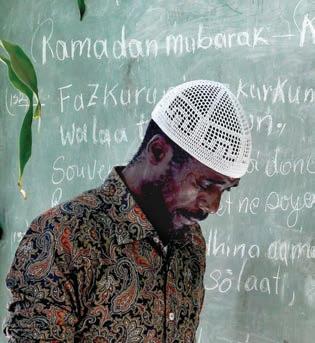
Today, in the United States, it is estimated that about 73% of American Muslims are Sunni, 16% Shia, and smaller percentages identify with the Nation of Islam, Ahmadiyya, or are non-denominational.
Council Member Latisha Johnson raised concerns over the tangible outcomes of a $200,000 allocation from the previous budget designated for air purifiers near Stellantis’ east-side auto plants, indicating a gap in project execution and communi-
As Detroit’s budget season unfolds, one critical question looms large: Are we genuinely prioritizing the advancement of everyday Detroiters in our financial planning? How does each budget decision directly contribute to enhancing the quality of life for the city’s residents, particularly those in historically underserved communities?
“The end of Ramadan marks the beginning of the major Islamic holiday Eid al-Fitr, the festival of the breaking of the fast,” said Khalil. “On this day, many Muslims attend a religious service, visit relatives and friends, and exchange gifts.”
In addition to Muslims celebrating Ramadan worldwide, a growing number of people from other religions, or with no religious affiliations, have joined in observing Ramadan and adhering to its practices and major pillars.
people believe that they need to for themselves and others to live better lives.”
Gun Violence
From page A-1
the pandemic emerged, to 2022 when the federal government declared the pandemic had ended. The goal was to determine if patterns had changed, whether there were demographic variants, and if there were any policies in place to address the issue.
Astonishing Increase in Youth Gunfire
Deaths
“I think of transformational leadership as a thoughtful approach that causes people to change but also causes the systems and circumstances they are operating in to change too,” Ivory said. “Transformational change doesn’t just ask people to do certain things; it asks them to change their view of what’s possible and excites them to drive that change together because they believe that what they’re doing will create positive change for everyone. That’s how entire systems change because
What Panchal and her team found was astonishing: From 2019 to 2022, gunfire deaths among children ages 17 and younger increased by nearly 50%, becoming the leading cause of death for young people in the U.S. In 2022 alone, some seven children a day were shot and killed, according to the report.
“Chancellor Ivery is a true transformational leader and an outstanding CEO, who is more than worthy of the CEO of the Year Award he just received, “ said Prof. James C. Mays, who teaches entrepreneurship and supply chain management at WCCCD’s Corporate College. “In his 27 years at WCCCD, Dr. Ivery has elevated WCCCD to become nationally recognized for excellence and innovation and preparing our students professionally and personally to do great things in the world.”
“During this period, firearm death rates gradually rose until 2017, then slowed through 2019, before sharply rising with the onset of the pandemic and holding steady in 2022,” according to the report. From 2019 to 2022, the firearm death rate among children and adolescents increased by 46% (from 2.4 to 3.5 per 100,000).”
At the same time, gun assaults “accounted for two out of three firearm deaths among children and adolescents in 2022,” according to the report. “Leading up to the pandemic, gun assaults made up about half of all child and adolescent firearm deaths. However, from 2019 to 2022, the share of these firearm deaths attributed to gun assaults grew from 54% to 66%.”
Black Children Are Disproportionally Affected
Perhaps the most alarming data point, however, involved Black young people.
Since the pandemic began, “firearm death rates have sharply increased among Black and Hispanic children and adolescents” and doubled among Black youths during those three years, according to the report. “In 2022, the rate of firearm deaths among Black youth was 12.2 per 100,000 — substantially higher than any other
BLAC will hold a virtual town hall meeting to discuss its policy recommendations on Thursday, May 12 at 4 p.m. Join BLAC and a virtual audience in discussing the recommendations to support the Black community.
It’s more than just numbers and spreadsheets—it’s about making real changes that folks in our neighborhoods can see
racial and ethnic group and six times higher than White youth.”
Even excluding homicides, Black children were disproportionately affected by gun violence, according to the report.
BLAC is housed in the Michigan Department of Labor and Economic Opportunity. Members represent many professional backgrounds, including economics, law, public safety, health and wellness, arts and culture and media. They leverage their experiences and expertise to make recommendations to the governor on critical issues affecting the Black community.
“Black and male children and adolescents were more likely to experience nonfatal firearm injuries than their peers,” according to the report. Since then, however, “disparity among Black youth firearm injuries and exposures has been exacerbated since the pandemic began.”
To learn more about BLAC and this upcoming event, visit www.michigan.gov/BLAC.
While homicides get attention, Panchal says, “I think one of the things we’re highlighting here is, in addition to these youth deaths, there are also many more youth who go on to survive these gunshot wounds.”
At the same time, those survivors “may face additional obstacles with both their physical and mental health” that their families and teachers must deal with, Panchal says. “A shooting doesn’t just affect the youth who may be at the center of that gun violence exposure. It also affects the well being of their family and, perhaps, their community.”
While the data are alarming, Panchal points to different steps taken to help children exposed to gun violence, including the federal Safer Communities Act. Besides tightening gun laws, the legislation set aside millions of dollars for anti-violence intervention programs, after-school programs, and accessible, school-based mental health programs. The report also points to other federal initiatives, including programs aimed to boost Black youth mental health in response to sharply rising suicide rates.
Still, the report ends on a cautionary note about what could happen if gun violence isn’t brought under control.
“Gun violence can lead to increased mental health and substance use concerns,” according to the report. “The recent increase in child and adolescent firearm injuries and deaths come at a time when concerns about youth mental health have grown, but access to and utilization of mental health care may have worsened.”
According to the Pew Research Center, approximately four million Muslims are living in the United States. Black Muslims represent about 20% of all Muslims in America. And half of the Black Muslims living in the United States, the Pew Research Center reports, have converted to Islam as opposed to being born into the religion. Pew also reports that Islam is the fastest-growing religion in the world.
From a historical perspective, it shouldn’t be surprising that a growing number of African Americans are being identified as Muslims. Black Historians - and others who know and are willing to tell the truth – say that of the total number of enslaved Africans transported from the Mother Land to the New World over a span of 400 years, between 10% and 30% were from African countries with a history linked to Muslim/

In a feature story published last year, Time Magazine wrote that many non-Muslims are now observing and celebrating Ramadan for a bevy of reasons, including taking the opportunity to learn more about the Muslim faith and its spiritual tenets. Other non-Muslims said that they celebrate Ramadan to support Muslim friends or receive the mental and spiritual benefits of fasting. Some said they observe Ramadan to practice self-imposed discipline.
“The month of Ramadan contains many attributes and blessings,” said Dawud Walid, executive director of the Michigan Chapter of the Council on American-Islamic Relations. “It is a month of fasting to grow in awe of Allah, cultivating sincerity, renewing patience, standing at night in prayer, and commiserating with the needy and oppressed. This magnificent and blessed month also has built into it the qualities of compassion and forgiveness.”
Purchasing

Page A-2 | March 13-19, 2024 | michiganchronicle.com LONGWORTH M. QUINN Publisher-Emeritus 1909-1989 Michigan Chronicle A Real Times Media Newspaper SAMUEL LOGAN Publisher 1933-2011 JOHN H. SENGSTACKE Chairman-Emeritus 1912-1997 CONTACT US 1452 Randolph • Detroit, MI 48226 • (313) 963-8100 • e-mail: newsdesk@michronicle.com HIRAM E. JACKSON Publisher | JEREMY ALLEN Executive Editor 866 328 512 958 104 954 117 11 18 29 34 54 7 37 PICKS 326 861 931 703 675 111 1284 5433 WEEK’S BEST LOTTERY Page A-2 | April 20-26, 2022 | michiganchronicle.com LONGWORTH M. QUINN Publisher-Emeritus 1909-1989 Michigan Chronicle A Real Times Media Newspaper SAMUEL LOGAN Publisher 1933-2011 JOHN H. SENGSTACKE Chairman-Emeritus 1912-1997 CONTACT US 1452 Randolph • Detroit, MI 48226 • (313) 963-8100 • e-mail: newsdesk@michronicle.com HIRAM E. JACKSON Publisher | AJ WILLIAMS Managing Editor ADVERTISING DEADLINE Classified: 3 p.m Friday Copy, corrections and cancellations, preceding the Wednesday publication. Display: 12 p.m. Friday preceding the Wednesday publication. For all news and calendar items: Deadline is two weeks prior to event. Weeks that contain holidays, deadline is Thursday prior to publication date. OFFICE HOURS: Mon.-Fri. 8:00 a.m. to 5:00 p.m. Closed Sat. and Sun. The Michigan Chronicle is published every Wednesday. Periodical Postage, paid at Detroit, MI. Price $1.00 and other post office. MEMBER OF AUDIT BUREAU OF CIRCULATION POSTMASTER Send address changes to: MICHIGAN CHRONICLE | 1452 Randolph • DETROIT, MI 48226 THE MICHIGAN CHRONICLE PUBLISHING COMPANY 1452 Randolph • Detroit, MI 48226 • Phone: (313) 963-8100 Publication No.: USPS 344-820 Right To Choose From page A-1 Report From page A-1 Dr. Curtis Ivery From page A-1 602 513 482 871 350 754 123 14 31 35 40 56 24 37 PICKS 205 149 013 526 816 960 5190 6285 WEEK’S BEST LOTTERY BWE AD 6cols x 5.25 Opera House Ad 3cols x 5.25 BIN AD 3cols x 5.25 corporate boards to have more diverse representation and pass the legislation. Better collection and analysis of criminal justice data: BLAC recommends data collection and professional analysis be initiated with the assistance of our Attorney General, Michigan Commission on Law Enforcement Standards (MCOLES), Association of Michigan Prosecutors and other stakeholders to collaborate, collect and analyze data strategically. Ban no-knock warrants: Urging the House Government Operations Committee to hold hearings on HB 5013 and other
or
Home? With the My Home Reward Program, eligible applicants in select neighborhoods could pay ZERO closing costs!* Maximum qualifying annual income of $134,680. ENJOY THESE EXCLUSIVE BENEFITS: • No closing costs • Reward can be used with most mortgage programs • Eligible for select neighborhoods *Visit IndependentBank.com/zeroclosingcosts for details. Taxes and insurance required. Program subject to change or termination. Joe Lockwood Senior Residential Loan Officer NMLS ID: 139312 P: 248.918.5961 E: JLockwood@ibcp.com Troy | 201 W. Big Beaver, Suite 201 IndependentBank.com/mortgage/jlockwood Contact me today to learn more!
Refinancing a
Midtown Detroit Inc.
Appoints Detroit Native Maureen L. Stapleton as Interim Executive Director
By Jeremy Allen
EXECUTIVE EDITOR
Maureen L. Stapleton, a former state representative who served parts of Detroit’s east side and Midtown neighborhoods, has been named interim executive director of Midtown Detroit Inc. (MDI). The nonprofit organization is responsible for creating community and economic development in the Midtown area of Detroit. Stapleton will assume her new role on March 1st, 2024. She joins MDI following Sue Mosey’s retirement at the end of 2023.
“I am excited and honored to join the dynamic team at Midtown Detroit Inc. and continue the work of the organization and its founding Executive Director Sue Mosey,” said Stapleton. “As someone who has been committed to community change throughout my career, I greatly admire the work that former Executive Director Sue Mosey has achieved.”
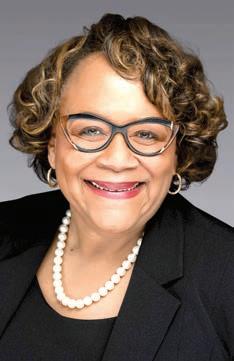
During her first 60 days in office, Stapleton aims to engage the community in developing an innovative update to the Community Strategic Plan. This collaborative effort will involve residents, anchor institutions, cultural entities, developers, foundations, and the thriving small business community, setting the stage for MDI’s next phase of growth.
“I am committed to harnessing the collective energy and spirit of the entire Midtown community to drive impactful change, foster inclusive growth, and support the small business community, which is vital to placemaking in Midtown,” Stapleton continues. “Together, we will cultivate a Midtown that thrives and serves as a beacon of innovation and opportunity for all.”
Stapleton brings over 20 years of experience in community development, government, and operational administration to her new role. She began her career in government, working for the City of Detroit, Wayne County, and the City of Indianapolis. In 2009, she was elected to represent District 4 for parts of Southeastern Michigan in the Michigan House of Representatives, providing her with a deep understanding of Midtown’s significance in Detroit.
Most recently, Stapleton was appointed by Columbus Mayor Ginther to serve as the executive director of CelebrateOne, an initiative in Columbus, Ohio, aimed at reducing infant mortality and improving health equity in Franklin County. During her tenure, she successfully led efforts to develop a strategic plan to address the community’s infant mortality rate and racial health disparities.
“Maureen has spent her career successfully making organizations stronger and
See MAUREEN STAPLETON Page A-4
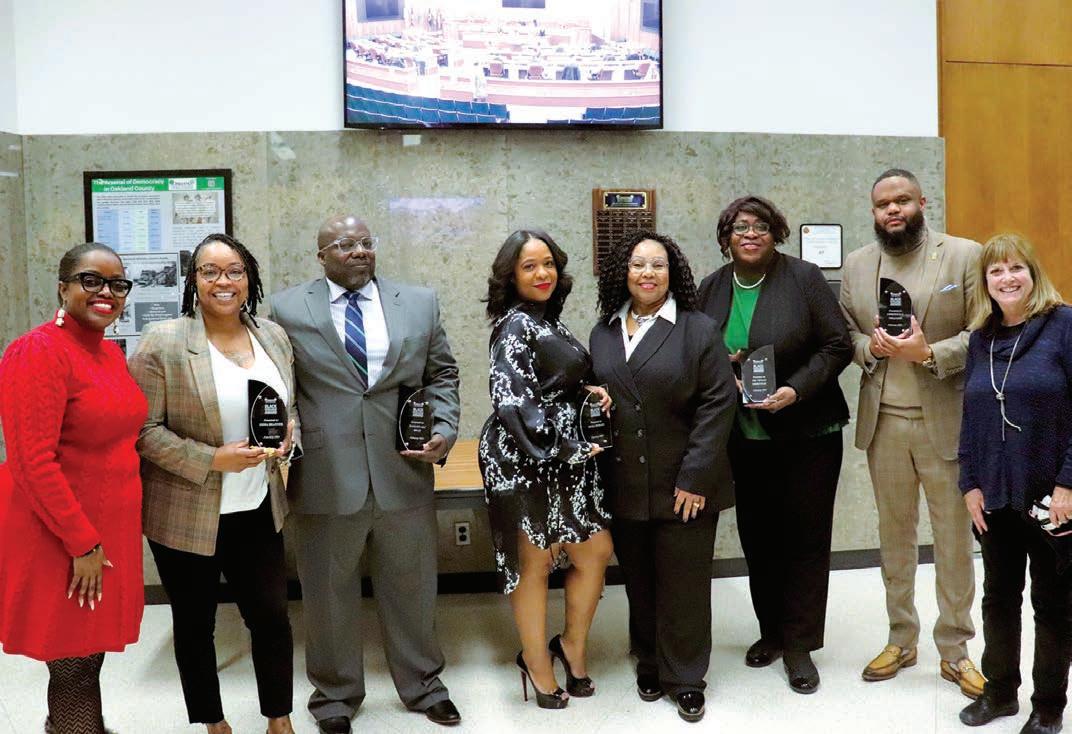
Board of Commissioners Recognizes Oakland County Residents With Black Excellence Award
By Jeremy Allen Executive Editor
Five Oakland County residents were recently honored with the Oakland County Board of Commissioners Black Excellence Award during a March board meeting. The program was part of the County Board’s commemoration of Black History Month, which also included proclamations recognizing the event. The awardees were nominated by the public, and all qualifying nominations were reviewed by a panel of commissioners that included Commissioners Angela Powell (D-Pontiac), Yolanda Smith Charles (D-Southfield), and Linnie Taylor (D-Southfield).
“This award helps shine a light on the meaningful accomplishments of some very important people we don’t hear about every day,” Powell said. “Honoring these recipients during Black History Month reminds us that their contributions are valued not only in February, but also through the entire year.”
The honorees were chosen for their notable achievements and the strides they have taken to improve their communities.
“It is a privilege to join with my fellow commissioners in recognizing these five outstanding Black leaders who continually strive to reach their highest potential,” Smith Charles said. “Their efforts are admirable, and this county is better because of them.”
This year’s awards mark the third year the Oakland County Board of Commissioners has presented the Black Excellence honors.
“This year’s recipients embody Black excellence,” Taylor said. “Their professional and personal accomplishments, dedication to improving their communities and impressive qualifications are
Beyond Events: Beaumont Commons’ Activities Supervisor is a Descendent of Frederick Douglass
By Lynzee Mychael
In the community of Beaumont Commons, Dearborn, where activities bloom year-round, there’s a figure whose dedication to enriching the lives of residents transcends mere planning and promoting. Shavon Baker, the community’s activities supervisor, organizes events that celebrate culture, history, and heritage. But what many might not realize is that for Baker, Black History Month isn’t just a series of events—it’s deeply personal.
Baker’s connection to Black history runs deep, coursing through her veins like a steady stream of pride and resilience. As she orchestrates gatherings and programs, she carries with her a legacy intertwined with one of the most pivotal figures in American history—Frederick Douglass. “Douglass was my fourth-generation great grandfather,” Baker reveals, her eyes alight with reverence. “He was a beacon of hope, a voice for the voiceless.”
Growing up, Baker’s understanding of her lineage was nurtured by stories of Douglass’s bravery and eloquence. But it was during her time at Morris Brown College in Atlanta, GA, and later at Wilberforce University in Ohio— both historic Black institutions—that her knowledge blossomed into a profound appreciation for the struggles and triumphs of her ancestors.
Yet, Baker’s heritage is a tapestry woven with
threads from diverse backgrounds. She proudly recounts the union of Douglass’s granddaughter, Mary Louise, with her great-great-grandfather, Yoke “Charles” Leung, a man of Chinese descent. Their union, a testament to the intersectionality of identity, resulted in a rich familial tapestry spanning continents and cultures.
At family reunions, photographs of Mary Louise and other relatives adorned the walls, a testament to the interconnectedness of their past. However, amid the cherished memories, Baker’s quest for identity remains unabated. She yearns to unearth the story of her greatgreat-grandmother, Mary Louise, whose presence looms large in family lore yet remains elusive in imagery. Beyond her personal journey, Baker is on a mission to excavate the roots of her family tree, tracing back to Douglass’s African ancestry. And within the walls of Beaumont Commons, Dearborn, she finds a fertile ground to sow the seeds of knowledge and understanding. For over two decades, she has nurtured a community eager to learn, to understand, and to honor the mosaic of Black history.
As February unfolds, Baker’s tireless efforts culminate in a series of enlightening programs. From exploring the significance of African headwraps to delving into the life of A. Philip Randolph, each event is a testament to the richness and diversity of Black heritage. And at the
noteworthy and serve as a beacon to their Oakland County neighbors near and far.”
This year’s Black Excellence Award winners are:
Eisha Branner – A native of Pontiac, Branner has dedicated her efforts to building a more resilient community through empowering youth and parents. She is the founder and CEO of E-Community Outreach Services, which assists families in need through case management services, community resources and other support services. Earlier this year, she also unveiled the Women in Business Working Center, a space dedicated to empowering women entrepreneurs and fostering their success. She holds a master’s degree in human services and has four daughters.
Myka Burley – With work experience at Fortune 500 companies, Burley has long advocated for tech as a driver toward economic equity and facilitated more than $4 million in philanthropic digital inclusion investments and tech training programs. A resident of Southfield, she is an associate director for the skills team at Michigan Central and serves on NPower Michigan’s Regional Advisory Board, supporting the nonprofit’s mission of creating pathways to economic prosperity through digital careers for military veterans and young adults from underserved communities. She was also appointed to serve on Brilliant Detroit’s Engagement Committee.
Dr. Vivian Greenway – Greenway has more than 30 years of clinical experience and has championed healthcare case management’s role in healthcare outcomes. She helped secure a proclamation from Gov. Gretchen Whitmer to recognize October 8-14, 2023, as Case Management Week in Michigan and currently serves on several national committees for the
Case Management Society of America, including the Diversity, Equity, Inclusion and Belonging Committee. Greenway also serves on the Leadership Succession Committee for Sigma Theta Tau Nursing Honor Society and volunteers as a mentor. She is a member of Alpha Kappa Alpha Sorority, Incorporated®.
Damany Ali, Head – Founder, investor, and mechanical engineer, Head (of Pontiac), has served as the chair of the Pontiac Regional Chamber since 2016. He is also the principal officer for the Pontiac United Education Coalition, a nonprofit that brings together school district leaders, businesses, and community organizations to improve educational outcomes for children in Pontiac. Head’s Pathways to Prosperity program promotes lifelong learning for residents, and his service on the Oakland Literacy Council board helps advance literacy as a fundamental right throughout Oakland County. Professionally, he is the managing partner of Essential Recycling.
Christian J. Williams – Also a recipience of Michigan Chronicle’s 40 Under 40 Awards in 2023, West Bloomfield resident Christian J. Williams has made a significant mark on the career services field. He established CJW Consulting Group, an entrepreneurial professional development business that offers consulting for résumé development, cover letters, LinkedIn optimization, and interview coaching. His firm has helped nearly 2,000 national clients, ranging from individual contributors to vice presidents and C-suite professionals, develop their careers. Concurrently, he serves as a supplier diversity consultant for Henry Ford Health, advocating for minority- and women-owned business enterprises. He is also a proud member of the Alpha Phi Alpha Fraternity.
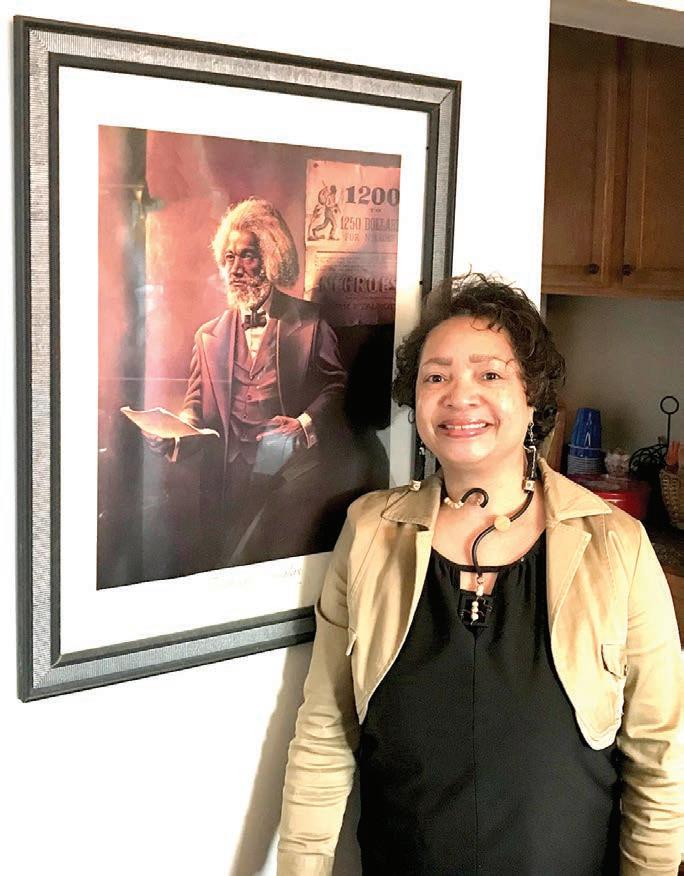 Shavon Baker
Shavon Baker
michiganchronicle.com A3 | March 13-19, 2024
Roots.
See SHAVON BAKER Page A-4
Maureen L. Stapleton
From left to right: Angela Powell, Eisha Branner, Damany Ali Head, Myka Burley, Linnie Taylor, Dr. Vivian Greenway, Christian J. Williams, and Marcia Gershenson
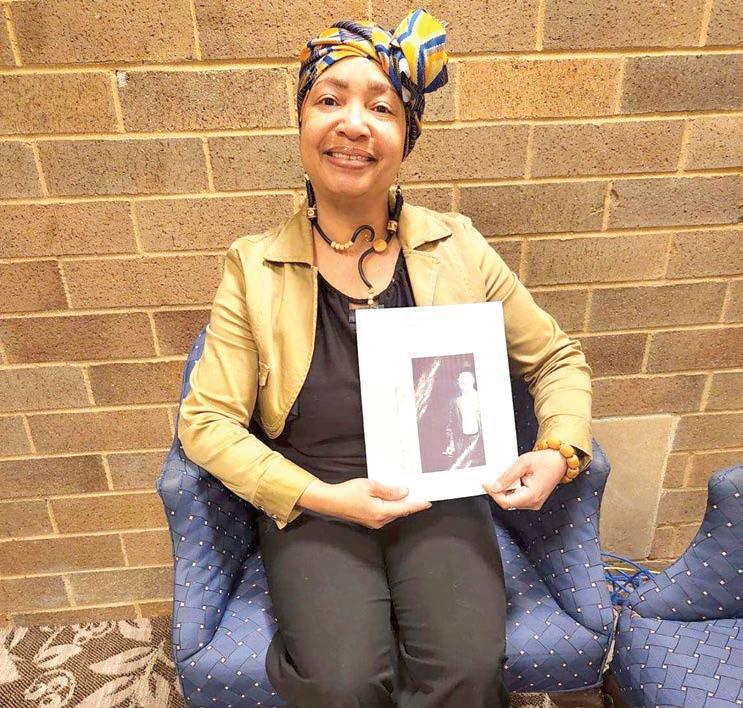
thusiasm to everything she does.”
heart of it all is Baker, a custodian of history, a beacon of inspiration.
Marcia Filek, senior director of residential services, attests to Baker’s unwavering dedication, stating, “It’s no surprise that Shavon has such a historic family legacy. She brings such energy, knowledge, and en-
From page A-3
has a proven track record of spearheading community development and long-range planning efforts for federal, state and local government agencies,” said Ned Staebler, Midtown Detroit Inc. Board Chair. “Her deep roots in our Midtown and New Center Detroit communities make her ideally suited to guide this organization through this leadership transition and her vast understanding of organizational development makes her uniquely qualified to create a strategic plan to move Midtown Detroit Inc. forward.”
Stapleton has a track record of tackling hard challenges. During her tenure as state representative, she led and launched a range of community initiatives and policy discussions to increase collaboration on neighborhood and state projects. She also co-led the National Technology Advisory Adoption Council, a partnership between local and
For Beaumont Commons, Dearborn, where every corner resonates with stories of resilience and triumph, Shavon Baker stands as a living testament to the enduring legacy of Black history. Through her unwavering commitment, she not only honors her ancestors but also illuminates the path for generations to come—a path paved with the indomitable spirit of those who came before.
state elected officials to achieve comprehensive broadband adoption in urban communities nationwide. Additionally, she spearheaded the Municipal Lighting Authority legislation that led to the creation of the Detroit Public Lighting Authority (PLA), which was responsible for restoring Detroit’s aging street lighting system.
Stapleton previously served as president and principal consultant with Detroit-based Community Enterprises, LLC where she led organizational development, government relations and community affairs consulting services for clients such as Health Alliance Plan, United States Forest Service, Columbus 20/20, the County of Wayne, Detroit Public Schools and various school districts.
Stapleton earned a master’s degree in organizational development and change from Bowling Green State University, completed master’s level course work at Wayne State University in public administration, and has a bachelor’s degree in psychology from Howard University in Washington, D.C.
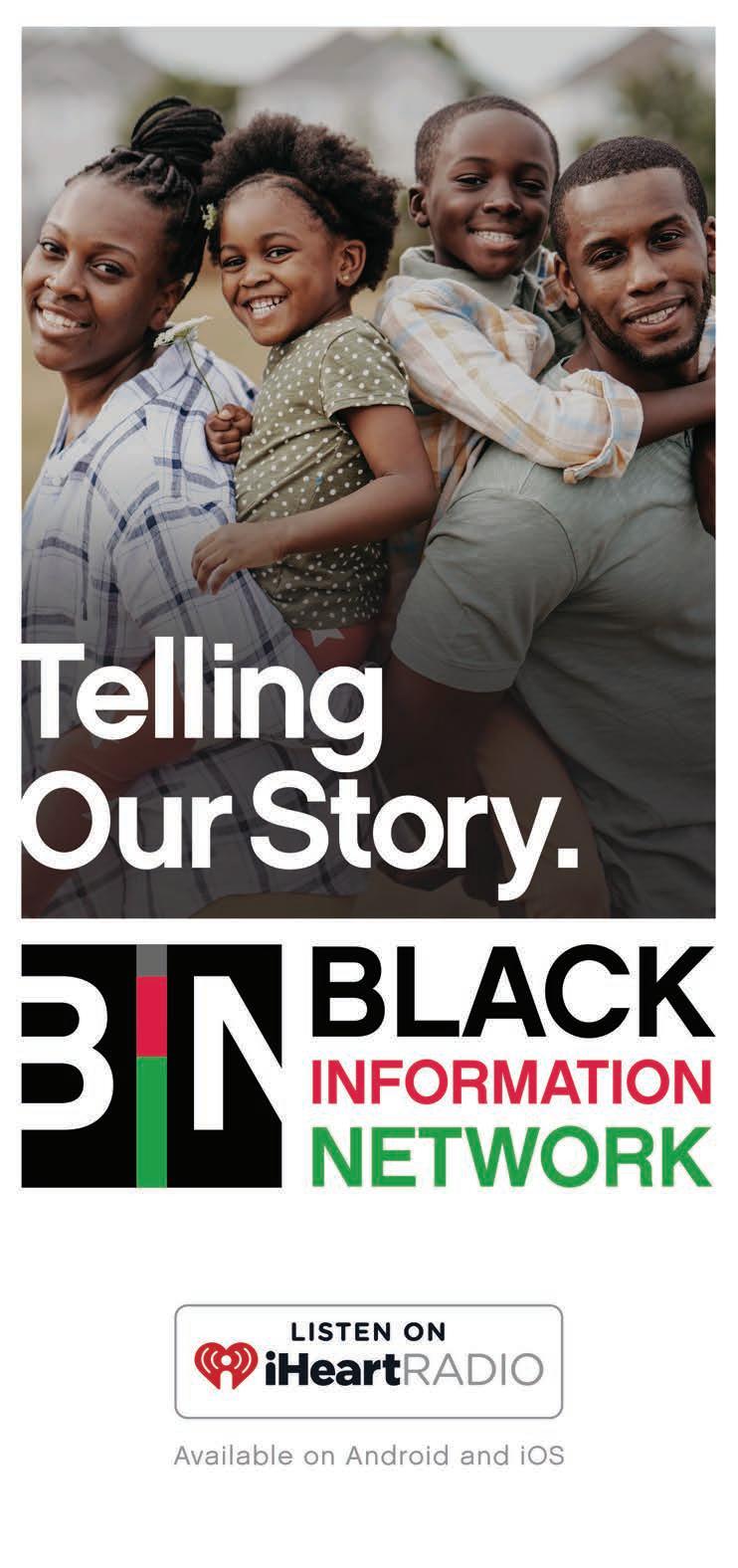

Page A-4 | March 13-19, 2024 | michiganchronicle.com
A-3
Shavon Baker There are enough things out there going viral. Get your COVID-19 and flu vaccines. Help keep your immune system from going viral. Talk to your health care provider. Michigan.gov/COVIDFluRSV
From page
Maureen Stapleton
A5 | March 13-19, 2024
Money.
Frederick Paul II Named Associate Director of Detroit’s Small Business Support Network Office
By Jeremy Allen
EXECUTIVE EDITOR
Invest Detroit, New Economy Initiative (NEI), and the Community Foundation for Southeastern Michigan have joined forces in an effort to bolster the small business landscape in Detroit, Hamtramck, Highland Park, and other Wayne County communities. As part of this collaborative endeavor, Frederick Paul II has been appointed as the next Small Business Network Associate Director, with a focus on advancing the mission of enhancing an inclusive small business support network comprising nonprofit business organizations (BSOs).
A Detroit native, Paul II brings to the table a wealth of experience as the founder of Fahrenheit 313, Detroit’s Hottest Sneaker Exchange. His entrepreneurial journey underscores a deep-rooted commitment to not only celebrating sneaker culture but also giving back to the community through philanthropic endeavors. Operating his small business on Livernois in Detroit, Paul II intimately understands the unique challenges and opportunities that entrepreneurs face in the city and has dedicated himself to fostering positive change.
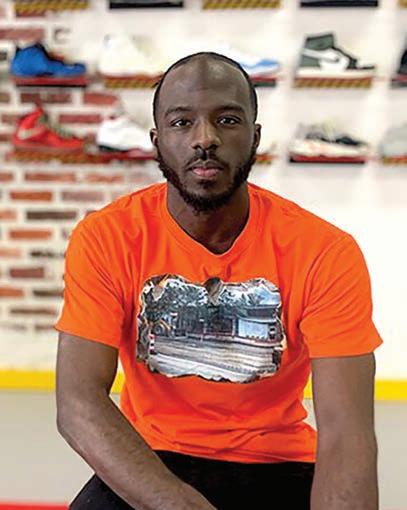
Lily Hamburger, director of the Small Business Support Network, lauded Paul’s appointment, citing his genuine entrepreneurial success and community leadership as assets that will lead economic opportunities in Detroit, particularly for women- and minority-owned businesses.
“Frederick Paul’s real experience as a successful entrepreneur and community leader make him uniquely qualified to continue driving economic growth and empowerment in Detroit, especially for historically underserved individuals,” said Hamburger. “His ability to overcome setbacks and his commitment to service make him a valuable addition to the Invest Detroit team and exemplifies the spirit of Detroit.”
In his role as Small Business Network Associate Director, Paul II will spearhead various initiatives aimed at fortifying the local small business ecosystem in an equitable, inclusive, and impact-
See FREDERICK PAUL Page A-6
This post was originally published on Word In Black
By Fedrick C. Ingram
There are numbers you know, and then there are numbers you feel.
For instance, I know that Black children make up 15% of this country’s K-12 public schools.
I also know that Black folks make up roughly the same percentage of U.S. citizens.
But when I read The Adequacy and Fairness of State School Finance Systems, a report from the Albert Shanker Institute, and saw that Black children are 3.5 times more likely than white children to be in chronically underfunded school districts, well, I can feel that number.
That’s because I was that number.
What should feel like a lifetime ago feels like yesterday for me growing up as a Black boy in a tough part of Miami. I know what it feels like to read from outdated textbooks and play music with broken instruments. Those experiences propelled me to pursue higher education at Bethune-Cookman University. It inspired me to
 By Stacy M. Brown
By Stacy M. Brown
A report released on Feb. 17 by the National Association of Real Estate Brokers (NAREB) revealed that African American women have emerged as trailblazers in Black homebuying, collectively making significant strides in education, employment, and entrepreneurship.
The NAREB’s 2023 Women Investing in Real Estate (WIRE) report revealed a 5.6% increase in homeownership among Black women between 1990 and 2019. During the pandemic, Black women aged 45–54 and those over 75 experienced the most significant growth, with a 2.9% increase. Even in the initial stages of the pandemic, when homebuying slowed, Black women outperformed their male counterparts.
“With the rise of Black women buying homes, there is hope for the future. Homeownership is a testament to the resilience and strength of Black women, contributing to closing the racial wealth gap and creating paths toward long-term financial stability and a legacy for their families,” Dr. Courtney Johnson Rose, president of NAREB, expressed in a news release.
“The upward trajectory of Black female homeownership embodies the resilience and determination to overcome historical challenges and pave the way for social and economic progress,” Dr. Rose added.
Further highlighting the positive trend, the WIRE report shows Black female homebuyers rebounding faster and consistently outpacing their male counterparts during the economic recovery from the pandemic. The data underscores Black women’s growing status and strength in American society.
NAREB plans to celebrate the accomplishments of Black women during its 2024 MidWinter Conference in Charlotte, North Carolina, from Feb. 28 to March 2. On March 1, Dr.
become an educator, and to return to the classrooms and communities that have been economically forgotten.
Yet as sobering as the report is for Black K-12 students and their families, it is by no means a new trend. The root of the issue lies deep in our country’s troubling past. After Reconstruction — those few brilliant years when America lived up to its promise of righting the wrongs of slavery and racebased violence — the country returned to its worst instincts. It closed its eyes to an epidemic of lynchings and fought against movements to desegregate stores, the military, and education.
To keep Black people out of white neighborhoods, America invented redlining, the New Dealera practice of designating Black neighborhoods as less desirable and locking Black folks into houses they couldn’t
And
Rose, Charlotte Mayor Vi Lyles, and Wells Fargo EVP Georgette Dixon will participate in “A Fireside Chat with Women of Impact” at the Marriott Charlotte City Center.
“I’m looking forward to sharing my story, the triumphs and challenges, as well as hearing from my esteemed colleagues as we go on to discuss what’s next for women leaders and entrepreneurs,” Dixon said. “Wells Fargo is excited to be a leader in this space of supporting women’s empowerment with a variety of programming through organizations like NAREB and the Women’s Business Enterprise National Council (WBENC).”
The WIRE report documents the economic gains that have laid the foundation for Black women’s success, representing women of the nation’s population, 52% of the nation’s American population, and 12.5% of all women. Furthermore, statistics reveal that 63.4% of African American women over 16 are active in the labor force, with 89.3% having graduated high school or its equivalent.
In entrepreneurship, Black women have made remarkable strides, with businesses owned by Black women growing by 50% between 2014 and 2019. In 2021, 17% of Black women were starting a new business, surpassing white women and men.
The real estate industry is also witnessing a positive trend toward diversity, with an increasing number of Black women carving a niche for themselves. Dr. Rose emphasized the ongoing need for mentorship programs and targeted educational resources to eliminate barriers for underrepresented groups.
In response to the WIRE report, NAREB will also host a one-day event for Black women in real estate and finance as part of their annual convention on July 3, in New Orleans, Louisiana, continuing their commitment to fostering inclusivity and empowerment in the industry.

michiganchronicle.com
See UNDERFUNDED SCHOOLS Page A-6
the 70s,
schools
those
property
the resources to match schools in whiter, more affluent communities.
sell for profit. That practice was outlawed in
but it all but ensured that
in
districts, funded through
taxes, would suffer. They simply did not have
Without adequate funding, Black students in chronically resource-starved schools are often taught by younger, inexperienced teachers who aren’t being paid very well. Black students are also 1.2 times more likely to encounter a law enforcement officer than a school counselor — hardly the support they need to thrive. And, Black students are more than twice as likely to “receive a referral to law enforcement or be subject to a school-related arrest” than their white peers. This is the reality our community feels and suffers from every day. Even for Black children who, like me, made it out of underfunded schools to head to historically Black colleges and universities, the news is not much better. The HBCU network of more than 100 schools does an incredible job for our community, matriculating 10% of all Black students and graduating half of the nation’s Black doctors, lawyers, and teachers. Still, a 2023 Department of Education report found that HBCUs in 16 states have been underfundBlack Women Lead the Charge in Homeownership Surge Frederick Paul II The Steep Price of School Underfunding
the damage persists.
Underfunded Schools
From page A-5
ed by some $12 billion. Heartbreaking, if not fully surprising.
Despite our endless push for education, even when it meant hiding knowledge for fear of abuse and death, America has yet to truly, meaningfully invest in schools that serve Black children.
I do not pretend that I alone can cure this ill, but I wake up every day in my position here at the AFT striving to ensure all our students — but especially our Black students — are getting the education they want so they can have the future they deserve.
We do this by helping distribute millions of free books to kids and families. We do this by pushing for
more career and technical education programs that offer kids multiple pathways to the American dream. We do this by rallying with local and state leaders to push back against extremist policies that target our children, our communities, and our history.
registered may update their registra=on at www.expressSOS.com
NOTICE OF REGISTRATION FOR THE SPECIAL GENERAL ELECTION TO BE HELD ON TUESDAY, APRIL 16, 2024 DETROIT, MICHIGAN
The last day to register in any manner other than in-person with the local clerk is Monday, April 1, 2024.
ALer this date, anyone who qualifies as an elector may register to vote in person with proof of residency (MCL 168.492) at the Detroit Department of Elec=ons or the Detroit City Clerk’s office.
TO THE QUALIFIED ELECTORS OF DETROIT, MICHIGAN:
Department of ElecNons
We do this work because we know that a democracy cannot thrive if one community is repeatedly — persistently — starved of resources. And we know that America cannot thrive if it continues to deny equal rights and opportunity to Black people, who have fought, cried, and died in a seemingly endless struggle to ensure their home country lives up to its founding promise of liberty and justice for all.
Frederick Paul
From page A-5
ful manner. This includes overseeing convening activities, data collection efforts, and communications with BSOs, which play a crucial role in supporting underserved business owners and fostering business growth across all stages. Additionally, Paul will contribute to the grant fund established by the partnership, assisting in the grant review process, communicating grant recommendations, and evaluating the performance of the business support network.
“I am excited about the opportunity of harnessing my diverse experiences to inspire and uplift aspiring entrepreneurs, hand in hand with the exceptional team at Invest Detroit and other esteemed Business Support Organizations,” Paul II said.
“My commitment is rooted in the belief that through mentorship and collaboration, we can continue to foster an inclusive ecosystem where even those historically marginalized can flourish in realizing
their entrepreneurial ambitions.”
PLEASE TAKE NOTICE that any qualified elector of Detroit, Michigan who is not already registered, may register to vote at the office of the Detroit Department of Elections or the office of the Detroit City Clerk, the office of the County Clerk, a Secretary of State branch office, or other designated state agency. Registration forms can be obtained at mi.gov/vote and mailed to the Detroit Department of Elections or the Detroit City Clerk’s office. Voters who are already registered may update their registration at www.expressSOS.com
2978 W. Grand Blvd. Detroit, MI 48202
HOURS OF OPERATION:
City Clerk’s Office (Coleman A. Young Municipal Ctr.) 2 Woodward Ave., Ste. 200 Detroit, MI 48226
The last day to register in any manner other than in-person with the local clerk is Monday, April 1, 2024. After this date, anyone who qualifies as an elector may register to vote in person with proof of residency (MCL 168.492) at the Detroit Department of Elections or the Detroit City Clerk’s office.
Department of Elections City Clerk’s Office (Coleman A. Young Municipal Ctr.) 2978 W. Grand Blvd. 2 Woodward Ave., Ste. Ste. 106 Detroit, MI 48202 Detroit, MI 48226
• Regular business hours: Monday through Friday from 8:00 a.m. to 5:00 p.m. (Department of ElecNons) Monday through Friday from 9:00 a.m. to 4:00 p.m. (City Clerk’s Office)
HOURS OF OPERATION:
• Saturday, April 13th from 8:00 a.m. to 4:00 p.m. and Sunday, April 14th from 8:00 a.m. to 4:00 p.m. (Department of ElecNons)
• Regular business hours: Monday through Friday from 8:00 a.m. to 5:00 p.m. (Department of Elections)
• Elec=on Day, Tuesday, April 16th from 7:00 a.m. to 8:00 p.m.
Monday through Friday from 9:00 a.m. to 4:00 p.m. (City Clerk’s Office)
• Saturday, April 13th from 8:00 a.m. to 4:00 p.m. and Sunday, April 14th from 8:00 a.m. to 4:00 p.m. (Department of Elections)
PLEASE TAKE NOTICE that the City of Detroit will be vo=ng in the Special Primary for the following offices:
The partnership, established in 2021 with a $19.5 million fund, aims to provide small businesses with inclusive access to capital, practical assistance, information, and valuable connections to business resources. Supported by contributors such as the Community Foundation for Southeastern Michigan, Ford Foundation, Hudson-Webber Foundation, The Kresge Foundation, Ralph C. Wilson, Jr. Foundation, William Davidson Foundation, and W.K. Kellogg Foundation, the fund is aligned with NEI’s focus on supporting both existing and new small businesses with fewer than 50 employees.
• Saturday, April 13th from 9:00 a.m. to 4:00 p.m. and Sunday, April 14th from 9:00 a.m. to 4:00 p.m. (City Clerk’s Office)
Representa=ve in State Legislature District 13
• Monday, April 15th, voting ceases at 4:00 p.m.
• Election Day, Tuesday, April 16th from 7:00 a.m. to 8:00 p.m.
Persons with disabili=es needing accommoda=ons should contact the Department of Elec=ons at 313-876-VOTE (8683)
PLEASE TAKE NOTICE that the City of Detroit will be voting in the Special General Election for the following offices:
Representative in State Legislature District 13
Persons with disabilities needing accommodations should contact the Department of Elections at 313-876-VOTE (8683)
Janice M. Winfrey Detroit City Clerk
Janice M. Winfrey Detroit City Clerk
Since its inception, the Small Business Network and NEI have allocated over $12 million from the Inclusive Small Business Support Network Fund, with a primary goal of empowering underserved and underrepresented entrepreneurs to launch, expand, and scale their ventures.

Use your Smartphone’s camera to scan this QR Code for more access! Be sure to sign up for updates.
Use your Smartphone’s camera to scan the below QR Code for more access! Be

Page A-6 | March 13-19, 2024 | michiganchronicle.com
PLEASE TAKE NOTICE that any qualified elector of Detroit, Michigan who is not already registered, may register to vote at the office of the Detroit Department of Elec=ons or the office of the Detroit City Clerk, the office of the County Clerk, a Secretary of State branch office, or other designated state agency. Registra=on forms can be obtained at mi.gov/vote and mailed to the Detroit Department of Elec=ons or the Detroit City Clerk’s office. Voters who are already
Detroit’s Violence
Decline: Community-Led Initiatives Pave the Way for Change
By Biba Adams CONTRIBUTING WRITER
In the ten years since the Detroit bankruptcy, the city has grown and evolved – giving us the label as a “Comeback City.”
The evolution has been demonstrated in a number of ways, and one has been through the current downward trend in violence in our city. Once known as “Murder City,” the epidemic of violence in Detroit is improving due to the support of local government, police, and community violence intervention programs.
“We’re getting better with the support with this organizational model and this community model that we see now,” explains Darryl Woods, who has been a community activist in the city for nearly 30 years.
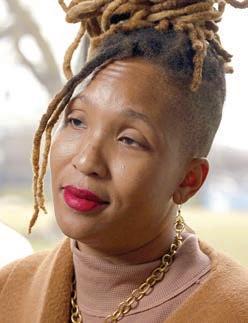
“There’s been, you know, there’s been a lot of challenges, challenges and a lot of areas in terms of being able to get young people connected to resources and opportunities and things of that nature. It’s so when you deal with a hopeless population, then that’s what you kind of see a lot of hopelessness, or when you can bring some real, meaningful, significant, impactful help to them that help bring about hope. Because young people don’t want to know how much you know, until they know how much you care.”
FORCE Detroit is one of several community violence intervention programs that use several key approaches to violence prevention: assessment, relationship building, intervention, wraparound support, and ongoing mentorship.
In addition to the work that the organization does locally, it has also participated in national learning communities and community organizing networks seeking to advance Community Violence Intervention Work, including the 2022 White House Community Violence Intervention Initiative, the Live Free Campaign, and most recently the CVI Academy at the University of Chicago.
“As people of faith, we know that our country’s legacy of racism, violence, and economic exploitation runs counter to what is prescribed in our most sacred texts,” the website notes.
“Sadly, the wealthiest and most powerful nation in the world is also one of the most violent and punitive. With almost 12,000 gun murders a year (more than the annual death toll of U.S. soldiers during the Vietnam War) and the highest incarceration rate in the world, we find ourselves in a moral crisis—a crisis which disproportionately impacts the poor and communities of color.”
Woods shares that the Detroit approach “is a holistic approach is not a law enforcement approach only, you know, although they play some roles in this. It’s not a governmental approach, but it’s a community approach. And it’s an approach that is driven by love, concern, and resources.”
Activist Teferi Brent, who is the men’s minister at Fellowship Chapel and serves on the Governor’s Black Leadership Advisory Council as the statewide Safety and Justice Chair, notes that the conversation around what is contributing to the downward spiral is nuanced. Brent praises the prosecutor’s office and the mayor. However, it also credits improvements in Detroit Public Schools, including the reduction in suspensions and the dropout rate along with a rising graduation rate.
“There is no such thing as the school to prison pipeline-there is a poverty to prison pipeline. Schools are not created to send people to prison--socioeconomic conditions in which the school system exists sends people to prisons, right, white supremacy sends people to prisons, racism, structural racism since people in prison, not schools, I wouldn’t dare disrespect the good work done by Black educators in this city by suggesting that the only thing they do, but the primary thing they do is send black babies to prison. There’s too much great work being done by the principals and educators in Detroit.”
Additionally, Brent notes that the commitment by the City of Detroit to fund community violence intervention programs and to create more employment opportunities and safe spaces for residents.
“Our mayor is quite literally putting his money where his mouth is,” Woods says.
Last summer, the city announced that six community partners had been selected for neighborhood Community Violence Initiative contracts.
Each selected group is responsible for reducing homicides and shootings in a 3.5 to 4.5 square-mile area, called a CVI Zone, using their own violence prevention strategy. Applicants were empowered to propose a specific approach based on their experience, expertise, and knowledge of the local community.
According to the press announcement, the program is funded by the American Rescue Plan. Deputy Mayor Todd Bettison, who led the program’s development, announced the six groups selected: Detroit Peoples Community, Detroit 300, New Era Community Connection, FORCE Detroit, Detroit Friends and Family, and the collective of Wayne Metropolitan Community Action Agency, Denby Neighborhood Alliance, and Camp Restore, which represents one group.
Together, these organizations have decades of experience preventing and responding to violence – but ShotStoppers will be the first time that the City of Detroit provides funding to strengthen and expand CVI services and measure results to determine which approaches work best.
“The city has made a real effort to create safer places spaces, and able to put resources in community type centers, community centers, and safe havens for our youth to be able to experience positive programming,” Bettison said.
“But there’s nothing like the boots on the ground that we see now people who directly engage in, but those who have been in long term incarceration, or those who are on probation, or parole, or those who are struggling in our schools and things of that nature, making sure that there’s some mentoring and some coaching opportunities for our young people, those are the things that are making a huge difference.”
oods explained that he was a victim of gun violence. He was shot at the age of 14--and then just a few years later, he was sentenced to more than 20 years behind bars for a violent crime. He notes that never receiving support for his trauma affected his life in a major way.
“Just today, I talked to a young man, he’s, he’s on probation. And, he has to take the GED. So, I was able to connect them to a GED program that has a stipend attached to it. So, while he’s studying, he can make some money. He’s also working at night, and he’s only 21 years old, but he’s determined to keep himself engaged so that he won’t be in a position to reoffend. That’s what mentoring can do.”
This is the second of a 10-part series that will dive deeply into FORCE’s mission and the impact CVI groups make toward the goal of violence reduction in communities.
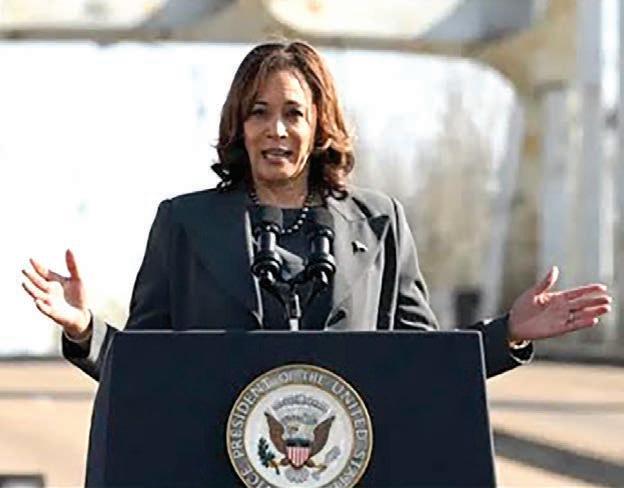
Vice President Harris Calls for Immediate Cease-Fire in Gaza
By Ebony JJ Curry Senior Reporter
Vice President Kamala Harris has made a compelling plea for an immediate cease-fire in Gaza, highlighting the dire humanitarian situation resulting from the prolonged Israel-Hamas conflict. During a speech in Selma, Alabama, Harris emphasized the critical need for peace, stating, “Given the immense scale of suffering in Gaza, there must be an immediate cease-fire, at least for the next six weeks.”
The Vice President’s comments represent the most forceful call for action from the Biden administration regarding the ongoing strife in Gaza, which has led to significant casualties and suffering. The demand for a cease-fire comes as President Joe Biden faces increasing pressure to mediate an end to the five-month war that began with a violent incursion by Hamas militants into southern Israel on October 7, resulting in approximately 1,200 deaths and 250 hostages. The conflict has since claimed the lives of over 30,000 Palestinians.
Amid the 59th anniversary of Bloody Sunday, an event marked by the brutal suppression of civil rights activists in Alabama, Harris drew parallels to the current humanitari-
an crisis in Gaza, stating, “People in Gaza are starving. The conditions are inhumane, and our common humanity compels us to act.” Despite acknowledging the necessity to address the humanitarian crisis, Harris also noted, “the threat that Hamas poses to the people of Israel must be eliminated.”
The Biden administration has disclosed that Israel is tentatively agreeable to a six-week cease-fire, which would encompass the liberation of vulnerable hostages, including women, children, and the elderly or wounded. Senior administration officials, preferring anonymity, indicated Israel’s acceptance of the cease-fire framework, though Hamas has yet to consent to the agreement.
In anticipation of the upcoming Muslim fasting month of Ramadan, starting March 10, President Biden expressed his hope for the cease-fire agreement’s finalization. Concurrently, the U.S. has initiated humanitarian aid airdrops into Gaza in collaboration with Jordan’s air force following a tragic incident where over 100 Palestinians perished as Israeli forces allegedly fired upon individuals awaiting food in Gaza City. U.S. Air Force C-130 cargo planes have been deployed, delivering over 38,000 meals along Gaza’s coastline, aiming to ensure the aid reaches
those in dire need and to circumvent the looting that has hampered ground-based aid delivery.
The juxtaposition of the struggles of the Black civil rights movement in the United States with the ongoing crisis in Gaza has sparked a complex debate. On the one hand, the comparison draws attention to universal themes of oppression, injustice, and the quest for freedom, inviting solidarity across disparate struggles. However, critics argue that equating these two distinct historical and geopolitical contexts might oversimplify the complexities of each and, in doing so, potentially disrespect the unique experiences and sacrifices of those involved in each movement. The act of drawing parallels between the civil rights struggles faced by Black people and the dire situation in Gaza requires a nuanced understanding of both situations, acknowledging their specificities while also recognizing the universal fight for human rights and dignity.
Vice President Kamala Harris’s call for a temporary cease-fire in Gaza, amidst the backdrop of civil rights commemorations, has ignited discussions on the adequacy of such measures. While some view this as a step forward in acknowledging the humanitarian crisis, others argue that a temporary cease-fire falls short of addressing the root causes of the conflict and ensuring lasting peace. The expectation was for a more robust and permanent solution, especially from President Biden, given the escalating violence and humanitarian impact. This difference in expectations versus the proposed solution raises questions about the political calculations behind these decisions, particularly in the context of domestic pressures and the international community’s response.
Speculation continues to rise regarding the timing of Harris’s announcement and its potential connection to domestic political dynamics, such as the recent Michigan primaries. With a significant number of uncommitted votes that came into play, some wonder whether the decision to advocate for a cease-fire, albeit temporary, was influenced by electoral considerations. The intricate balance between domestic political imperatives and international diplomatic strategies often shapes foreign policy decisions. In this case, the intersection of humanitarian advocacy and political strategy underscores the multifaceted nature of leadership decisions on the global stage, where the imperatives of human rights and political pragmatism often collide.
Michigan Braces for More Ozone Days Due to Climate Change
By Ebony JJ Curry SENIOR REPORTER
As Michigan welcomed the onset of its ozone season on March 1, the Michigan Department of Environment, Great Lakes, and Energy (EGLE) is gearing up to issue “Air Quality Advisories” to alert the public about potential harmful levels of pollution. This comes in the wake of a new report from the First Street Foundation, a non-profit research group, which highlights a concerning uptick in climate change-driven air pollution in the Great Lakes region, signaling more high ozone days ahead.
While the gains in air quality post-Clean Air Act seem to be diminishing due to climate change and local factors, the predicted increase in the Great Lakes is notably less severe compared to the threats faced by the western states, which are grappling with extended wildfire seasons. According to Jeremy Porter, head of climate implications research at First Street Foundation, told Planet Detroit, the disparity is significant, with areas like the Seattle and Portland metros potentially facing an additional two weeks of ozone and fine particulate matter pollution over the next 30 years, as opposed to Wayne County’s single additional day on top of its current ten days of poor air quality.
The report delineates a “poor air quality day” as any day that meets or surpasses the orange level of the Environmental Protection Agency’s Air Quality Index, indicating conditions “unhealthy for sensitive groups.” However, it’s worth noting that the study did not account for the impacts of Canadian wildfires, though Porter mentioned plans to include Canadian data in future models.
Ozone, a pollutant formed through a reaction involving nitrogen oxides, volatile organic compounds, heat, and sunlight, can cause respiratory issues and exacerbate conditions like asthma. With the Great Lakes’ abundant water sources contributing to nitrogen oxides through evaporation—a process likely to be amplified by a warming climate—the region could see an increase in ozone pollution.
Michigan’s ozone season, typically spanning March through October, might see an extension due to climate change, with last year marking metro Detroit’s earliest Ozone Action Day on April 15. Residents are advised to reduce driving, avoid refueling vehicles, and limit the use of gasoline-powered tools on high ozone days to mitigate pollution.
The report also raises concerns about the growing problem of wildfire smoke and its associated fine particulate matter, PM 2.5, in the eastern U.S. Despite the East’s lower exposure compared to the West, the population density makes the health impacts more pronounced, with a significant number of smoke-related asthma emergency room visits and deaths occurring in the East.
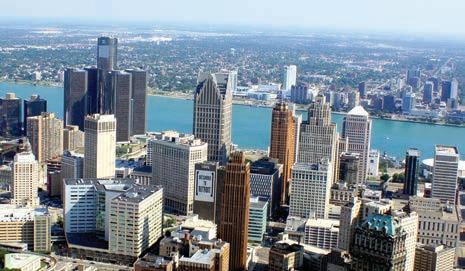
It is unsurprising that the detrimental impacts of ozone and air pollution disproportionately affect the Black community, particularly in Detroit, known as the most predominantly Black city in America. The city’s industrial legacy, coupled with systemic inequities in housing, healthcare, and economic opportunities, positions Black residents at a higher risk of exposure to harmful pollutants. This exposure is not merely a matter of geography but a reflection of deeper, historical, social injustices that have led to Black communities residing in proximity to pollution-heavy industrial sites and high-traffic areas. In Detroit, where the demographic is significantly Black, these environmental challenges intersect with racial disparities, magnifying the health and wellness gap and underscoring the critical need for targeted environmental justice and policy reform efforts.
Last summer’s Canadian wildfires, exacerbated by human-caused climate change, produced some of the worst air quality globally, a phenomenon experts predict might recur every 20 to 25 years due to increasingly hot and dry conditions.
The First Street report also observes a nationwide reversal in air quality improvements since the Clean Air Act of 1970, attributing it to more frequent wildfires and hotter days conducive to ozone formation. “We improved the air quality with regulatory policies, but climate is starting to reverse that trend,” Porter remarked, highlighting that this issue is predominantly a concern in the Western regions due to wildfire-related particulate matter, while the Midwest and Northeast are facing ozone increases mainly due to heat.
Given the health risks associated with PM 2.5, including cardiopulmonary issues and premature mortality, the report underscores the need for stringent air quality regulations, even in the face of pollution from “exceptional events” like wildfires. In 2023, the EPA recognized southeast Michigan as meeting federal ozone pollution guidelines for the first time since 2018, following EGLE’s successful appeal to exclude air quality data affected by wildfire smoke, highlighting the challenges in balancing regulatory standards with the realities of climate change-induced pollution.
Air pollution disproportionately affects Black communities, exacerbating health disparities and social inequalities. Studies have consistently shown that Black Americans are more likely to live in areas with high levels of air pollution, primarily due to historical housing policies and urban planning decisions that have placed these communities closer to industrial sites, highways, and other pollution sources. This exposure to elevated levels of pollutants such as particulate matter, nitrogen oxides, and ozone has been linked to higher rates of asthma, cardiovascular diseases, and other respiratory conditions in Black populations. The cumulative effect of these health burdens contributes to the cycle of economic and health disparities, limiting access to healthcare, employment opportunities, and overall quality of life.
Moreover, the intersection of air pollution with other social determinants of health—such as access to quality healthcare, housing, and green spaces—further compounds the adverse effects on Black communities. The lack of adequate healthcare infrastructure and resources in these areas means that the health impacts of air pollution are often not addressed effectively, leading to a greater incidence of emergency room visits and hospitalizations. Environmental justice campaigns have highlighted these issues, advocating for policies that not only aim to reduce overall pollution levels but also specifically target the reduction of disparities in air quality. Ensuring cleaner air for Black communities is not just an environmental issue but a crucial step towards rectifying long-standing health inequities and fostering a more equitable society.
michiganchronicle.com | March 13-19, 2024 | Page A-7
Alia Harvey-Quinn, CEO, FORCE Detroit
Tomorrow is loving more of the moments we love today.
Tomorrow is on.SM
What we do today impacts tomorrow.
Like how a silly moment with loved ones can create memories that last a lifetime. Or how Enbridge is investing in enough renewable energy projects to power more than one million homes. It’s part of how we’re fueling quality of life, so you can turn more moments into memories for years to come.
Learn more at tomorrowison.com

Page A-8 | March 13-19, 2024 | michiganchronicle.com
C ity .
B1 | March 13-19, 2024
Detroit Opera Names
Where City Meets Life and Life Meets Style
Andrew Berg as New Chief Development Officer
Detroit Opera Names Andrew Berg as New Chief Development Officer
By Jeremy Allen Executive Editor
By Jeremy Allen
EXECUTIVE EDITOR
Detroit Opera has appointed Andrew Berg as Chief Development Officer following a nationwide search, and the new appointment will be effective March 11, 2024. Berg brings nearly 20 years of experience in development and nonprofit management, deep Detroit ties, and a belief in the power of performance.
Detroit Opera has appointed Andrew Berg as Chief Development Officer following a nationwide search, and the new appointment will be effective March 11, 2024. Berg brings nearly 20 years of experience in development and nonprofit management, deep Detroit ties, and a belief in the power of performance.
Currently, Berg leads the principal gifts program at Cranbrook Educational Community in Bloomfield Hills, where he has partnered with the President and Program Directors to develop institution-wide donor strategies, define giving opportunities, and solicit significant gifts. He grew up attending Michigan Opera Theatre (now Detroit Opera) productions and presentations, acted in high school and college, was a member of the Detroit 300 Tricentennial Gospel Choir, and studied improvisation at The Second City.
Currently, Berg leads the principal gifts program at Cranbrook Educational Community in Bloomfield Hills, where he has partnered with the President and Program Directors to develop institution-wide donor strategies, define giving opportunities, and solicit significant gifts. He grew up attending Michigan Opera Theatre (now Detroit Opera) productions and presentations, acted in high school and college, was a member of the Detroit 300 Tricentennial Gospel Choir, and studied improvisation at The Second City.
In addition to Berg’s appointment, Detroit Opera has also announced two promotions: Director of Marketing and Communications Samantha Teter has been named Detroit Opera’s Chief Marketing Officer, and Juliano Bitonti Stewart, who has been serving as Interim Director of Development, is now Director of Development.
In addition to Berg’s appointment, Detroit Opera has also announced two promotions: Director of Marketing and Communications Samantha Teter has been named Detroit Opera’s Chief Marketing Officer, and Juliano Bitonti Stewart, who has been serving as Interim Director of Development, is now Director of Development.

In his current position at Cranbrook Educational Community, Berg recently closed a $1 million gift for student financial aid and climate change exhibition and education, and he is the project lead for the renovation of the Performing Arts Center.
In his current position at Cranbrook Educational Community, Berg recently closed a $1 million gift for student financial aid and climate change exhibition and education, and he is the project lead for the renovation of the Performing Arts Center.

Ethan Lloyd: Revolutionizing Detroit’s Digital World, One Viral Post at a Time
By Ebony JJ Curry SENIOR REPORTER
Previously, he spent 13 years in fundraising at the University of Chicago, most recently as Director of Development at Court Theatre, winner of the 2022 Tony Award for Regional Theatre. There, he helped recruit the largest and most diverse class of Trustees in Court Theatre history, secured key support to fund the Court’s biggest-ever production, and exceeded goals for contributed revenue through COVID disruptions. In prior positions at the University of Chicago, he worked with patrons, alumni, parents, and students and helped transform the parent and family philanthropy program, securing six- and seven-figure gifts for the Media Arts, Data, and Design Center, the Green Line Performing Arts Center, financial aid, career programs, and graduate education.
Previously, he spent 13 years in fundraising at the University of Chicago, most recently as Director of Development at Court Theatre, winner of the 2022 Tony Award for Regional Theatre. There, he helped recruit the largest and most diverse class of Trustees in Court Theatre history, secured key support to fund the Court’s biggest-ever production, and exceeded goals for contributed revenue through COVID disruptions. In prior positions at the University of Chicago, he worked with patrons, alumni, parents, and students and helped transform the parent and family philanthropy program, securing six- and seven-figure gifts for the Media Arts, Data, and Design Center, the Green Line Performing Arts Center, financial aid, career programs, and graduate education.
Berg is the founder and host of Inside the Fundraisers Studio, a popular long-form interview show. He majored in history and Spanish at the University of Michigan and spent summers during college volunteering in Guatemala, studied food systems in Cuba, and later managed a social service agency on the Mexican border. He was a long-time volunteer Spanish-language interpreter for artists at the Chicago Latino Film Festival and won best interpreter there in 2010. He got his start in nonprofit management as a supervisor at a Red Cross shelter in Houma, Louisiana, following Hurricane Katrina.
Berg is the founder and host of Inside the Fundraisers Studio, a popular long-form interview show. He majored in history and Spanish at the University of Michigan and spent summers during college volunteering in Guatemala, studied food systems in Cuba, and later managed a social service agency on the Mexican border. He was a long-time volunteer Spanish-language interpreter for artists at the Chicago Latino Film Festival and won best interpreter there in 2010. He got his start in nonprofit management as a supervisor at a Red Cross shelter in Houma, Louisiana, following Hurricane Katrina.
In his personal life, Berg is an avid cyclist, paddleboarder, and gardener. He created a family bike-camping program and won the 2021 Winter Bike Challenge in Chicago, enjoys exploring the waterways of Michigan and beyond, and has planted hundreds of native flowers, grasses, shrubs, and fruit trees. His favorite role is that of Papi to his two children.
In his personal life, Berg is an avid cyclist, paddleboarder, and gardener. He created a family bike-camping program and won the 2021 Winter Bike Challenge in Chicago, enjoys exploring the waterways of Michigan and beyond, and has planted hundreds of native flowers, grasses, shrubs, and fruit trees. His favorite role is that of Papi to his two children.
“I am thrilled that we have hired Andrew Berg as our Chief Development Officer,” Detroit Opera President and CEO Patty Isacson Sabee says. “Andrew is a Detroit resident who grew up attending Michigan Opera Theatre productions and joins us with nearly two decades of fundraising experience, most recently leading the principal gifts program at Cranbrook Educational Community. He has proven himself a skilled and adept partner to visionary artists and a people-first leader who thrives on mutual success.”
“I am thrilled that we have hired Andrew Berg as our Chief Development Officer,” Detroit Opera President and CEO Patty Isacson Sabee says. “Andrew is a Detroit resident who grew up attending Michigan Opera Theatre productions and joins us with nearly two decades of fundraising experience, most recently leading the principal gifts program at Cranbrook Educational Community. He has proven himself a skilled and adept partner to visionary artists and a people-first leader who thrives on mutual success.”
“I am honored and delighted to join Detroit Opera and serve as Chief Development Officer at such an exciting time of transformation,” Berg said. “I look forward to collaborating with artists, staff, the Board of Directors, patrons, donors, and community members to realize the ambitious vision for opera and dance in Detroit and beyond.”
“I am honored and delighted to join Detroit Opera and serve as Chief Development Officer at such an exciting time of transformation,” Berg said. “I look forward to collaborating with artists, staff, the Board of Directors, patrons, donors, and community members to realize the ambitious vision for opera and dance in Detroit and beyond.”
Chief Marketing Officer Samantha Teter is an experienced nonprofit marketing leader with more than 20 years of success in arts and culture organizations. Prior to joining Detroit Opera in July 2023, she most recently served as Vice President of Advancement with the Creative Discovery Museum in Chattanooga, Tennessee.
Chief Marketing Officer Samantha Teter is an experienced nonprofit marketing leader with more than 20 years of success in arts and culture organizations. Prior to joining Detroit Opera in July 2023, she most recently served as Vice President of Advancement with the Creative Discovery Museum in Chattanooga, Tennessee.
Previously, she served the Chattanooga Symphony & Opera for more than nine years, first as Director of Marketing and Corporate Sponsorships, then as Executive Director. Other major roles include Director of Marketing and Sales for the Colorado Symphony and Director of Marketing and Public Relations for the Fort Wayne Philharmonic. Teter has performed as an actor, singer, and dancer in theater and other stage productions for the past 35 years.
Previously, she served the Chattanooga Symphony & Opera for more than nine years, first as Director of Marketing and Corporate Sponsorships, then as Executive Director. Other major roles include Director of Marketing and Sales for the Colorado Symphony and Director of Marketing and Public Relations for the Fort Wayne Philharmonic. Teter has performed as an actor, singer, and dancer in theater and other stage productions for the past 35 years.
Director of Development Juliano Bitonti Stewart joined Detroit Opera as Associate Major Gifts Officer in June 2023 and was named Interim Director of Development in January. Stewart, a cellist and graduate of the Blair School of Music at Vanderbilt University, has dedicated his career as a fundraiser to strengthening the future of the arts, bringing his passion for the arts into every aspect of his life and career. As a fundraiser, he has held positions at the Nashville and Detroit symphonies and worked as a consultant for many other arts organizations around the country. Stewart has created string arrangements for pop artists around the world, plays bass in several Detroit-area bands, and builds custom mechanical keyboards.
Director of Development Juliano Bitonti Stewart joined Detroit Opera as Associate Major Gifts Officer in June 2023 and was named Interim Director of Development in January. Stewart, a cellist and graduate of the Blair School of Music at Vanderbilt University, has dedicated his career as a fundraiser to strengthening the future of the arts, bringing his passion for the arts into every aspect of his life and career. As a fundraiser, he has held positions at the Nashville and Detroit symphonies and worked as a consultant for many other arts organizations around the country. Stewart has created string arrangements for pop artists around the world, plays bass in several Detroit-area bands, and builds custom mechanical keyboards.
Ethan Lloyd is not just making moves; he’s reshaping the game. At 23, this young man is already a powerhouse in the digital world. From leading the City of Detroit’s social media revolution to being a central figure at Black Tech Saturdays, Ethan’s path is a vivid testament to what it means to be a young black trailblazer in today’s digital era.
“So, social media is the digital manifestation of public interest. It gives you the numbers, the views, the likes, the comments, the shares. Social media gives you the numbers to let you know how many people care about what you’re saying and how you’re saying it,” Lloyd said. “Whether you’re a business owner or just a person looking to expand your reach, because you can get real time data on how you’re being perceived by the public. It’s the number one form of socialization.”
Starting with a bold vision, Lloyd set out to unlock the secrets of going viral. As the mastermind behind the City of Detroit’s social media, he wasn’t just chasing clicks; he was crafting a movement. Under his guidance, Detroit’s digital presence didn’t just grow—it exploded, turning the city’s channels into hotspots of engagement and conversation, drawing eyes by the thousands, sometimes even millions. “I specialize on going viral,” he shared. “That’s what I know how to do. I know how to bring people to the door. What you do when they’re at the door is completely up to you.”
But Ethan’s vision was bigger than just numbers. Now leading the social of Black Tech Saturdays, he built a sanctuary for celebrating Black genius in tech—a space where Black innovators and dreamers can shine, share, and support one another. It’s not just about showcasing achievements; it’s about fostering a sense of unity, a community where the next generation of tech lead-
ers can find their footing and their fire. “I like to tell people that your success on social media is on the other side of your fears,” said Lloyd. “As soon as you remove your doubts and your fears and get out of your own way and just start posting, you will see very quickly that this is a great way to communicate with your audience.”
Lloyd’s influence didn’t stop there; he quickly made it evident that he did not fit in a box. Diving into the political realm with the Hill Harper campaign, he showed just how powerful social media can be when it’s used to not only speak but also to listen and connect. His work transcends the traditional role of a digital strategist; Lloyd is a catalyst for change, using his talents to boost both individual and collective voices within the city.
In a world where social media has become the new battleground for ideas and enterprises, Ethan Lloyd stands out not just for his skill but for his commitment to uplifting his community. He’s not just playing the game; he’s changing it, using his platform to weave a narrative of empowerment, innovation, and collective progress.
Lloyd’s journey is a clear signal to the world, and especially to the black community, that the digital age is ours to claim. He’s not just ahead of the curve; he’s drawing a whole new one, showing us all the power of social media when it’s wielded with purpose and heart.
“I love that social media gives everybody the opportunity to have a voice,” Lloyd expressed. “So, whether you’re black, white, or whatever, it is your chance to connect with your audience, and you’ll be shocked by who your audience actually is.”
In Detroit, a city of undying strength and spirit, Lloyd’s work is lighting up the digital skyline, painting a picture of a future where technology and community walk hand in hand. It’s more than engagement; it’s about lifting each other up and crafting a story of hope, resil-
ience, and shared success.
Ethan Lloyd has taken his mastery of the digital realm to new heights by demystifying the complex art of going viral for nearly thousands of people. Through workshops, online tutorials, and community-based initiatives, he has opened the door to the world of social media influence, teaching the intricacies of crafting content that resonates and engages on a massive scale. His approach blends the science of analytics with the art of storytelling, empowering individuals and organizations alike to connect with their audiences in meaningful ways. By sharing his insights and strategies, Ethan has become a pivotal educator in the realm of digital communication, equipping aspiring influencers and brands with the tools they need to amplify their voices and narratives in the crowded social media landscape.
“I feel the weight of the responsibility that I’ve been put here to fulfill,” Lloyd said. “It makes me feel as if I have an opportunity to speak on behalf of, quite honestly, the whole world, because the whole world is talking through their phone right now. What I like to tell people is that this is an opportunity to reach the whole world. I feel that reach, and it makes me very emotional. It makes me proud.”
As Ethan Lloyd continues to break barriers and forge new paths, his story stands as a beacon to every young Black person looking to make their mark in the digital world. It’s a vivid reminder of what we can achieve when we blend technology with tenacity and purpose, showing us the endless possibilities that lie ahead when we dare to dream and do things together. “Reaching 50 million people makes me feel everything that they feel, because I’m an empath, and that’s how I’m able to connect with my audience on such a deep and intimate level,” he shared. “So, I feel every emotion about it, but most importantly, I feel the responsibility of speaking to the whole world.”
Community Treehouse Center Detroit’s Solar Training Program Fuels the City’s Clean Energy Drive
By Ebony JJ Curry SENIOR REPORTER
Detroit’s Community Treehouse Center (CTCD) has announced a new initiative to bolster the city’s role in the clean energy sector, offering an eightweek Solar Pathways Workforce Training Program aimed at preparing participants for careers in the solar industry.
Scheduled to commence on March 13, the program represents CTCD’s first venture into providing comprehensive, industry-led courses in sustainable energy, highlighting Detroit’s commitment to clean energy
dedication to inclusivity and sustainability.
An open house and enrollment session is scheduled for the general public on March 13 at the Community Center at AB Ford, from 4:00 p.m. to 6:00 p.m., providing an opportunity for interested


individuals to learn more about the program and its potential impact on their careers and the community.
Detroit has firmly established itself as a dynamic hub within the clean energy sector, undergoing a transformative journey that intertwines technological innovation with sustainable development. This resurgence is marked by an array of initiatives and investments aimed at nurturing a robust clean energy ecosystem, from solar power projects to educational programs focused on renewable energy. The launch of programs like the Solar Pathways Workforce Train-
ing Program by the Community Treehouse Center Detroit exemplifies the city’s proactive approach in equipping its workforce with the necessary skills and knowledge to thrive in the solar industry. Such efforts are not only creating new career opportunities for Detroiters but also positioning the city as a key player in the national movement towards renewable energy solutions. With its commitment to inclusivity, sustainability, and economic growth, Detroit is redefining its industrial legacy to become a beacon of innovation in the clean energy landscape.
The launch of this program comes at a time when the solar industry is experiencing rapid growth. The 2020 National Solar Jobs Census reported over 231,000 workers in the sector, with expectations for the workforce to exceed 900,000 by 2035. This growth is not only a testament to the industry’s vitality but also to its role as a key player in the nation’s economic development, offering competitive wages and diverse employment opportunities.
Graduates of the Solar Pathways Workforce Training Program will receive a certificate and access to job placement services, including apprenticeships with the International Brotherhood of Electrical Workers Local 58 in Detroit, further contributing to the city’s burgeoning reputation as a hub for clean energy and sustainable development.
L
. Style .
ife
michiganchronicle.com
C ity . L ife . Style .
City Meets Life and Life Meets Style michiganchronicle.com B1 | March 13-19, 2024
Andrew Berg
Where
and job creation. The training will cover four specialized tracks: Solar Installation, Solar Community Engagement, Home Assessment, and Solar Sales, each limited to 25 participants to ensure an in-depth learning experience. This initiative underscores the importance of hands-on training in fostering a skilled workforce ready to meet the demands of the growing solar sector. With an enrollment fee of just $50, the program is designed to be accessible to a broad range of participants, including those with disabilities and members of marginalized communities, reinforcing the CTCD’s
Andrew Berg








Page B-2 | March 13-19, 2024 | michiganchronicle.com No matter how big or small your business, MEDC is here to help. Get access to resources, find the best talent and connect with the right partners. We’re your personal concierge for everything your business needs to succeed. Seize your opportunity at MICHIGANBUSINESS.ORG PURE OPPORTUNITY ® MICHIGAN LUCKY BEAN NOW SERVING : YOUR GROWING BUSINESS. T:10" T:21"




michiganchronicle.com | March 13-19, 2024 | Page B-3
The Daily 4 Red Ball Double Draw promotion runs for Monday - Saturday evening drawings only.


Page B-4 | March 13-19, 2024 | michiganchronicle.com The Detroit Metropolitan Wayne County Airport (DTW) SOAR Program creates access and opportunity for specialty retail small business owners to expose their products to thousands of airline passengers with an in-line specialty retail space in the Warren Cleage Evans Terminal. SOAR INTO A CONCESSION OPPORTUNITY TODAY! SCAN FOR: • SOAR PROGRAM OVERVIEW • WORKSHOP VIDEO • INSTRUCTIONS TO APPLY DEADLINE TO APPLY MONDAY MARCH 18 metroairport.com FOR MORE INFORMATION Email: Purchasing.Questions@wcaa.us
Our team is committed to delivering for our clients. We celebrate their commitment with initiatives like Sharing Success, which awarded 97% of colleagues additional compensation this year, nearly all in stock. This is the seventh consecutive year teammates received this award, totaling more than $4.8 billion.


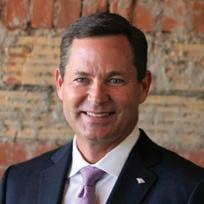

We are committed to being a Great Place to Work for our teammates in Detroit and around the globe. This includes providing industry-leading benefits, minimum wage at $23/hr on track to $25/hr by 2025 and opportunities to build a career with us. These are a few reasons we’ve been named one of America’s Most JUST Companies.
Matt Elliott President, Bank of America Detroit

Go to bankofamerica.com/detroit to learn more.
What would you like the power to do?®
Page B-6 | March 13-19, 2024 | michiganchronicle.com When you use the QRC feature certain information is collected from your mobile device for business purposes. For the annual Rankings, JUST Capital collects and analyzes corporate data to evaluate the 1,000 largest public U.S. companies across 20 Issues identified through comprehensive, ongoing public opinion research on Americans’ attitudes toward responsible corporate behavior. In determining the top 10 companies for workers, JUST Capital used its Workers Leaders Index which tracks the top 20% of companies in its annual Rankings that perform the best across the five worker related issues evaluated. https://justcapital.com Bank of America, N.A. Member FDIC. Equal Credit Opportunity Lender. © 2024 Bank of America Corporation. All rights reserved.
Everyday dedication meets everyday appreciation
for details
Scan






 Shavon Baker
Shavon Baker





 By Stacy M. Brown
By Stacy M. Brown





























